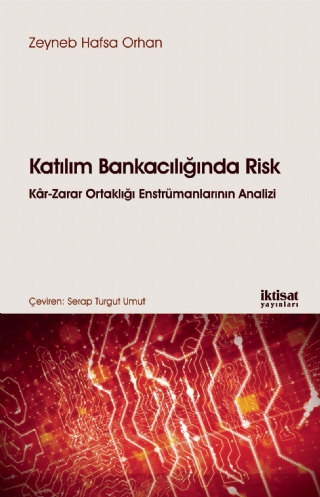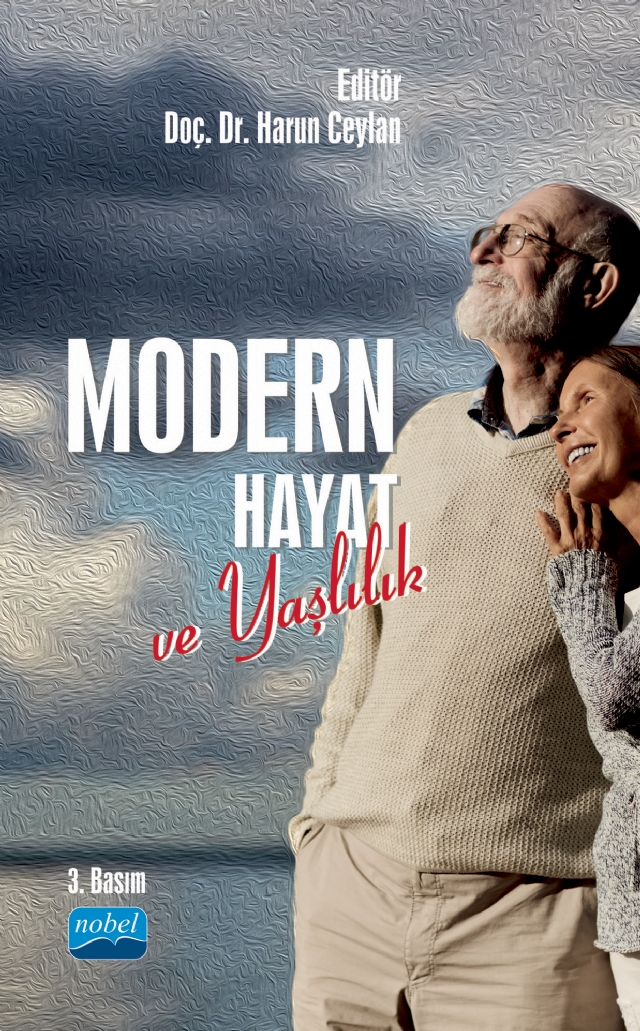Social Sciences and Humanities \ 3-5

Communication is something we cannot give up in order to understand, to explain, or to agree… A cycle that we cannot escape from, continuing and responding to what we understand, what we say, and our agreements… An escalator that goes and comes continuously from us to us, from us to you, from you to us, in short from person to person… A cornerstone of life. Contact…
It is a book that guides all individuals in the society these days when we complain about lack of communication and realize that communication is important... While it contributes to learning what communication skills are, it also sheds light on people's ability to see where they make mistakes... It answers the following questions that come to mind:
They don't understand me, I can't explain myself, what should I do?
I think I empathize, or am I not?
There is a constant conflict between us, how can I resolve it?
I'm unsuccessful in group work, why can't I express myself?
I can't convince… How can I do it?
Communication in the family is broken… Why?
My communication with my friends is very bad at my workplace, how can it be improved?
Am I a good listener?
It is a book that guides all individuals in the society these days when we complain about lack of communication and realize that communication is important... While it contributes to learning what communication skills are, it also sheds light on people's ability to see where they make mistakes... It answers the following questions that come to mind:
They don't understand me, I can't explain myself, what should I do?
I think I empathize, or am I not?
There is a constant conflict between us, how can I resolve it?
I'm unsuccessful in group work, why can't I express myself?
I can't convince… How can I do it?
Communication in the family is broken… Why?
My communication with my friends is very bad at my workplace, how can it be improved?
Am I a good listener?

Communication is a long process that started with the existence of human beings in the world, has survived to the present day and will continue in our future.
It is clear that it would be so difficult to explain a subject with such wide borders in the numbered pages of a book! However, by placing certain limitations, important parts of this long adventure were taken and tried to be conveyed to the reader within the framework of the introduction.
Starting from the definition of communication within this kind of limitation, after general information about communication such as its process, relationship with other disciplines, communication types, functions and models, interpersonal communication, mass communication and mass media, news agencies, historical communication and mass communication in Turkey. development, organizational communication, internet and social media. In the last two chapters of the book, the effects of communication on society and communication researches are discussed.
Each of these introductory information; It is researched, analyzed and published under separate headings by other academics, authors and researchers. The aim of this book, titled "Introduction to Communication", is to give general information about such studies as preliminary, and to direct those who want to deepen in their subjects to such studies.
It is clear that it would be so difficult to explain a subject with such wide borders in the numbered pages of a book! However, by placing certain limitations, important parts of this long adventure were taken and tried to be conveyed to the reader within the framework of the introduction.
Starting from the definition of communication within this kind of limitation, after general information about communication such as its process, relationship with other disciplines, communication types, functions and models, interpersonal communication, mass communication and mass media, news agencies, historical communication and mass communication in Turkey. development, organizational communication, internet and social media. In the last two chapters of the book, the effects of communication on society and communication researches are discussed.
Each of these introductory information; It is researched, analyzed and published under separate headings by other academics, authors and researchers. The aim of this book, titled "Introduction to Communication", is to give general information about such studies as preliminary, and to direct those who want to deepen in their subjects to such studies.

The first Turkish-Islamic States History book is a new and original work on the history of medieval Muslim and Turkish states. The book covers a wide historical period in chronological terms. In this process, the emergence of Islam, the acceptance of the religion of Islam by the Turks, the establishment of Muslim Turkish states and their dominance in the Islamic world; In addition, the organization, culture and civilization issues of these states were discussed. Thus, on the one hand, the political, social and cultural issues that developed in the history of Islam; On the other hand, the politics, organization, culture and civilization of the first Muslim Turkish states were discussed. The topics in the book are written in an original approach and academic style. The First History of Turkish-Islamic States book, prepared with the contribution of many academicians who are experts in their fields, is also a textbook for universities.

In the book, it has been tried to give a historical process how the science of astronomy has developed from the ancient times to the present. This work; it consists of six main sections: The Birth of Astronomy and Astronomy in Ancient Civilizations, Astronomy in the Ancient Greek Period, Medieval Astronomy, Renaissance and Copernican Theory, Modern Astronomy and the Development of Astronomy After the 17th Century. In the first part of the book, the contributions of ancient civilizations to astronomy are discussed, and in the second part, the contributions of the ancient Greek civilization to astronomy. The third part, which is devoted to medieval astronomy, consists of two parts, astronomy in the Christian World and astronomy in the Islamic World. In addition, in this part, the development of astronomy from the foundation of the Ottoman Empire to the Republic and the introduction of modern astronomy to the Ottoman Empire are discussed. In the fourth chapter, the Heliocentric Theory of the Universe founded by Copernicus, and in the fifth chapter, modern astronomy established by Kepler. The last chapter is devoted to the study of astronomy after the seventeenth century.

The indispensable element for all businesses is people. For this reason, businesses that attach importance to the selection, placement, training, promotion, evaluation and retirement of their employees have always been successful in business life.
The human resources management book is a resource that people or institutions that want to be successful in the processes from the recruitment of the personnel to their retirement can apply.
The human resources management book is a resource that people or institutions that want to be successful in the processes from the recruitment of the personnel to their retirement can apply.

From the moment we were convinced that man was born without a given meaning and was defined by the functions or roles he was assigned from the moment he opened his eyes, it became increasingly difficult to expect anything from man. Moreover, such expectations were always confronted with demands for freedom. This book is "What can we expect from a free man?" It grew out of a strong belief that the question can still be asked in a meaningful way. The different conceptions of man in the Islamic tradition of thought, despite all their differences, are optimistic about our expectations of man. However, how this expectation can be grounded. He found different answers within the philosophical, theological, mystical and jurisprudential perspectives in the tradition of Islamic thought.
The study, which includes fourteen articles, investigates the answers given by different disciplines in the tradition of Islamic thought and the different schools within these disciplines to the question of what a human is and what is really expected of him. For these perspectives, which all consider human life as a long story that progresses in a constant test, human is always something that is "being". The main factors that direct our ability to "be", where this ability should lead, and the areas of accrual constitute important topics in the evaluations of what a human being is. The articles in this study proceed through these questions, while investigating the nature of human beings in the traditions of philosophy, theology, mysticism and fiqh, on the other hand, they deepen the current possibilities of these perspectives.
The study, which includes fourteen articles, investigates the answers given by different disciplines in the tradition of Islamic thought and the different schools within these disciplines to the question of what a human is and what is really expected of him. For these perspectives, which all consider human life as a long story that progresses in a constant test, human is always something that is "being". The main factors that direct our ability to "be", where this ability should lead, and the areas of accrual constitute important topics in the evaluations of what a human being is. The articles in this study proceed through these questions, while investigating the nature of human beings in the traditions of philosophy, theology, mysticism and fiqh, on the other hand, they deepen the current possibilities of these perspectives.

The conceptions of the nature of man, the ethics of human actions throughout history. determined his political and metaphysical orientations. Therefore, it can be said that many emerging structures, from moral choices to social organizations, from state orders to education systems, are a direct or indirect manifestation of the answer to the question of what human is. For this reason, the question of what man is is central to any conception of the world. modernity. By radically transforming the classical conceptions of the nature of man, he revealed one of the most important breaks in human history. It is therefore a way of achieving a correct understanding of the modern period. It is through identifying and analyzing the transformations of human imagination in this period.
In this book, the debates about the nature of human being in modern Western thought are discussed and the effects of different definitions of human in these fields on the formation and transformation of various scientific disciplines are evaluated. In addition, the book also includes various debates in contemporary Islamic thought, providing an answer to the question of how the transformations that emerged with modernity affect human conceptions in the Islamic world. In this way, readers will have the opportunity to follow the simultaneous and simultaneous effects of the radically changing universe and human imagination.
In this book, the debates about the nature of human being in modern Western thought are discussed and the effects of different definitions of human in these fields on the formation and transformation of various scientific disciplines are evaluated. In addition, the book also includes various debates in contemporary Islamic thought, providing an answer to the question of how the transformations that emerged with modernity affect human conceptions in the Islamic world. In this way, readers will have the opportunity to follow the simultaneous and simultaneous effects of the radically changing universe and human imagination.

Ethics is a field that has been widely discussed in Islamic thought, from practical philosophy to various religious sciences. In this respect, while morality is accepted as one of the philosophical sciences, it is also discussed with different aspects in religious sciences such as hadith, kalam, fiqh and mysticism. In order to examine and present morality, which is at the intersection of multiple disciplines, with all its dimensions, these sciences should be considered in terms of their own internal dynamics. Such an effort seems essential for understanding the morality in Islamic thought with all its dimensions.
In line with this need, roundtable meetings titled "Basic Characteristics of Islamic Moral Literature" were held between March 2013 and March 201A within the scope of the "Islamic Moral Thought Project" carried out by the Scientific Studies Association (ILEM) and the Science Culture and Education Association (ILKE), and the literature on morality has its own discussed in terms of their specifics. This book in your hand consists of the articles of the presentations made at these meetings.
In line with this need, roundtable meetings titled "Basic Characteristics of Islamic Moral Literature" were held between March 2013 and March 201A within the scope of the "Islamic Moral Thought Project" carried out by the Scientific Studies Association (ILEM) and the Science Culture and Education Association (ILKE), and the literature on morality has its own discussed in terms of their specifics. This book in your hand consists of the articles of the presentations made at these meetings.
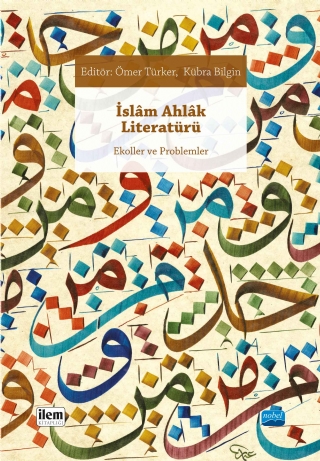
Ethics is a field that has been widely discussed in Islamic thought, from practical philosophy to various religious sciences. In this respect, while morality is accepted as one of the philosophical sciences, it is also discussed with different aspects in religious sciences such as hadith, kalam, fiqh and mysticism. In order to examine and present morality, which is at the intersection of more than one discipline, with all its dimensions, these sciences should be handled in terms of their own internal dynamics. Such an effort seems to be essential for understanding the morality in Islamic thought with all its dimensions.
Based on this need, roundtable meetings titled “Basic Characteristics of Islamic Moral Literature” were held between March 2013 and March 2014 within the scope of the “Islamic Moral Thought Project” carried out by the Scientific Studies Association (ILEM) and the İLKE Science Culture and Education Association, and the literature on ethics was held in the context of its own characteristics. has been discussed. This book in your hand consists of articles from the presentations made at these meetings.
Based on this need, roundtable meetings titled “Basic Characteristics of Islamic Moral Literature” were held between March 2013 and March 2014 within the scope of the “Islamic Moral Thought Project” carried out by the Scientific Studies Association (ILEM) and the İLKE Science Culture and Education Association, and the literature on ethics was held in the context of its own characteristics. has been discussed. This book in your hand consists of articles from the presentations made at these meetings.
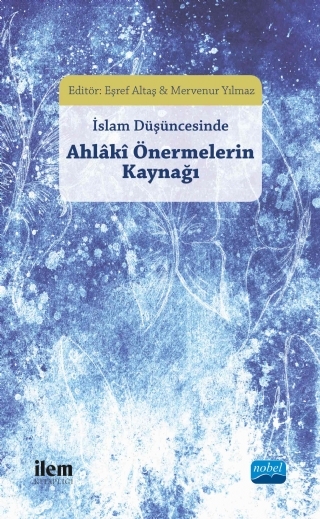
What is the principle or source that enables us to evaluate moral judgments, in other words, moral propositions as good or bad? It is possible to find different answers in the history of thought that this source is pleasure, nature, emotion, reason, intuition, society, and divine will. But where do I get that Justice is good and cruelty is bad? The answer we give to the question brings us face to face with different questions again. For example, if our answer is the mind, what is the characteristic of this mind or which mind is it? Do human nature, emotions, intuition play a role in the society's judgment of good and bad actions regarding actions? What is the role of divine revelation in determining the moral field? In this book, it is aimed to deal with such questions that can be multiplied in relation to moral judgments, mainly under the question of the source of moral propositions.

The debate about whether the biological and hereditary characteristics inherited in the formation and differentiation of personality, which can be expressed as human nature in the most general sense, or whether the diversity of experiences are of fundamental importance, points to a problem that can be traced back to the early periods of philosophy and continues to exist with the same vitality today. The theories of temperament, as a way of explaining human nature, are related to physics and medicine, while their results are directly related to human actions and being in this world.
The book in your hand is an expanded output of the roundtable meetings held in 2015 on the theories of temperament in Islamic thought within the scope of the Islamic Moral Thought Project. Articles in the book; It focuses on the temperament theory, which has a very central place in the understanding of human personality and character, after Hippocrates (375 BC) and Galen (d. 200), and more specifically, the appearance of the problem in some Islamic philosophers and theologians. The book aims to be a start for readers who want to deal with the subject and to contribute to new reading, understanding and interpretation processes that will be made in comparison with the new aspects of the problem.
The book in your hand is an expanded output of the roundtable meetings held in 2015 on the theories of temperament in Islamic thought within the scope of the Islamic Moral Thought Project. Articles in the book; It focuses on the temperament theory, which has a very central place in the understanding of human personality and character, after Hippocrates (375 BC) and Galen (d. 200), and more specifically, the appearance of the problem in some Islamic philosophers and theologians. The book aims to be a start for readers who want to deal with the subject and to contribute to new reading, understanding and interpretation processes that will be made in comparison with the new aspects of the problem.

This study, which is an attempt to analyze the etymology of the concept of love (al-mehabbe), aims to reveal the expansions of the concept of love in Islamic thought regarding its metaphysical, physical, moral and political dimensions.
In the study, by pointing out the difference in nature of the love of Allah and the love of the creatures, the problems that Islamic thinkers discussed around the concept of love were included, thus providing the opportunity to compare the writings of Islamic philosophers, theologians and mystics about love.
This work, which reveals the analysis of the concept of love in the light of the texts written on Islamic thought, aims to inform its readers that love is an indispensable trait for the individual to gain moral competence and to establish social cohesion perfectly.
In the study, by pointing out the difference in nature of the love of Allah and the love of the creatures, the problems that Islamic thinkers discussed around the concept of love were included, thus providing the opportunity to compare the writings of Islamic philosophers, theologians and mystics about love.
This work, which reveals the analysis of the concept of love in the light of the texts written on Islamic thought, aims to inform its readers that love is an indispensable trait for the individual to gain moral competence and to establish social cohesion perfectly.
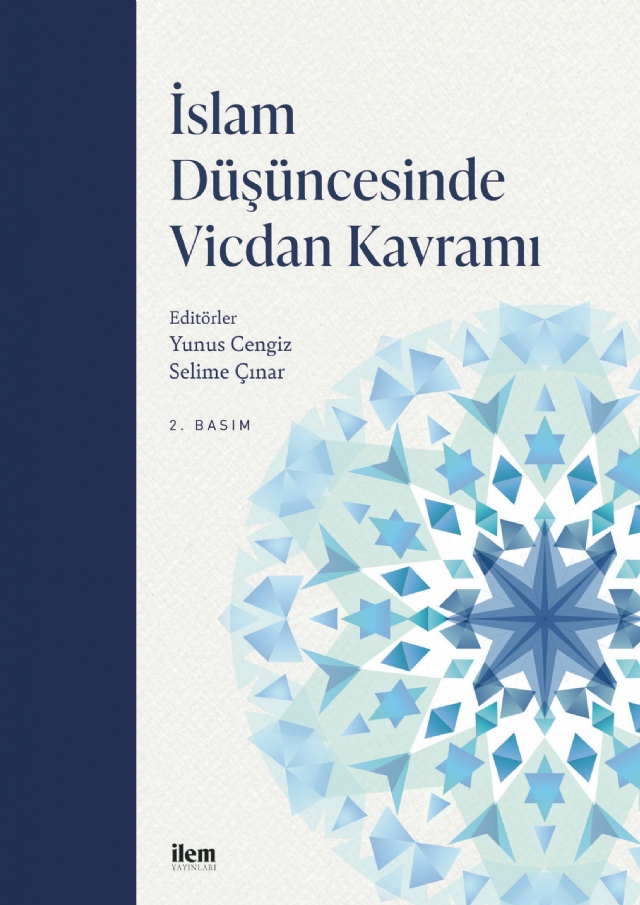
The concept of conscience, which is one of the key concepts for moral thought, is often used in the sense of "moral consciousness" today. When we look at the thought of Islam, it is difficult to say that the word conscience is used in this sense or that it is commonly used with such a content. As a matter of fact, in many texts, this concept is mentioned in a way that corresponds to intuition in an epistemological sense, not moral.
The aim of this study is to process the concept of conscience through Islamic traditions and to determine the equivalent of the concept in these traditions. This situation necessitates us to deal with the texts that aim to analyze the mental states and their practical consequences that provide the moral awareness of the actor against an action, regardless of whether the conscience is literal or not. If we do this, we will not only find the opportunity to reinterpret the classical texts on moral psychology, but also contribute to the reproduction of Islamic moral philosophy.
In the articles included in this book, which consists of the works presented at the Conscience in Islamic Thought Workshop hosted by İLEM-ILKE on June 3-4, 2016 within the scope of the Islamic Moral Thought Project, the way of problematizing the inner state that encourages people to act correctly, their reflections in different fields and psychological -theological foundations are discussed in terms of relevant traditions.
The aim of this study is to process the concept of conscience through Islamic traditions and to determine the equivalent of the concept in these traditions. This situation necessitates us to deal with the texts that aim to analyze the mental states and their practical consequences that provide the moral awareness of the actor against an action, regardless of whether the conscience is literal or not. If we do this, we will not only find the opportunity to reinterpret the classical texts on moral psychology, but also contribute to the reproduction of Islamic moral philosophy.
In the articles included in this book, which consists of the works presented at the Conscience in Islamic Thought Workshop hosted by İLEM-ILKE on June 3-4, 2016 within the scope of the Islamic Moral Thought Project, the way of problematizing the inner state that encourages people to act correctly, their reflections in different fields and psychological -theological foundations are discussed in terms of relevant traditions.

The book in your hand may sound a bit ambitious, but it is an attempt at a philosophical interpretation of Islam. What this means for us is that today's people want to test knowledge with its philosophical dimensions. Moreover, let this type of knowledge be the field of metaphysical knowledge. One of the most important approaches of contemporary epistemology is the principle of verification. In the nature of this principle, whether a proposition is true or not is directly proportional to whether the content of that proposition is supported by facts. What is wanted to be done here is to apply the principle of verification on the data of religion with a philosophical methodology. The starting point of such an attempt is to reveal the importance of the philosophical dimension of the data of revelation, as well as the principles of belief and worship of religion. In order for today's people to believe in religious or philosophical knowledge and to accept its truth, they must be convinced with their mental, logical and philosophical proofs. In other words, the "why" is more important than the "how". In this study, we tried to deal with the data of revelation in this way. What is wanted to be done here is to ground the revelation data of the religion of Islam with its mental and philosophical dimensions, to reveal the "why" and "why", in short, to focus on "wisdom", and leave the "how" to the experts. This work of ours is not a repetition of what is known or a longing for some past achievements. It is not an effort to renew our faith by trying to reconcile scientific developments or discoveries with the verses of the Qur'an. What is desired to be done here is to consider a truth with different dimensions. While we are trying to rediscover our science, wisdom, philosophy and civilization, it is necessary to see the stones we will lay on this path as an effort to create a solid ground.
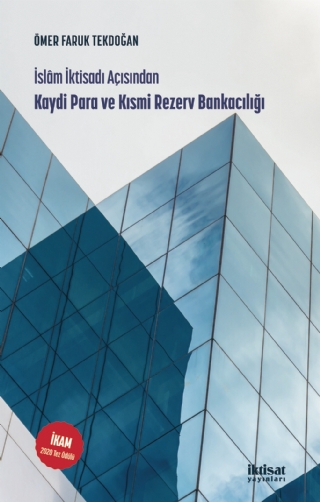
The partial reserve system, which we can call the basis of modern finance, has been the subject of discussion from past to present due to its weak structure, the role it played in economic instability and the problems it created. This interest-based system, which ensures that most of the money supply is dematerialized, has led to a macro-ribâ system that envelops economic life. The full reserve system, which was developed as an alternative to this system, could not find its place in practice. From the point of view of Islamic economics, the fact that the current system is riba-oriented and causes an unfair distribution of resources has necessitated the evaluation of the alternatives put forward from this perspective. The fractional reserve system operates based on confidence that commercial banks and central banks will provide sufficient liquidity when needed, and thus in essence it is prone to financial crises.
is weak and fragile. From this perspective in the book, the problems that are claimed to arise in economies with the discovery of fractional reserve banking are examined, the applicability of full reserve banking and how sufficient it is for a solution are examined, and the suitability and drawbacks of both systems in terms of Islamic economics are discussed. In addition, the effect of both banking systems on economic stability was compared using an agent-based simulation model.
is weak and fragile. From this perspective in the book, the problems that are claimed to arise in economies with the discovery of fractional reserve banking are examined, the applicability of full reserve banking and how sufficient it is for a solution are examined, and the suitability and drawbacks of both systems in terms of Islamic economics are discussed. In addition, the effect of both banking systems on economic stability was compared using an agent-based simulation model.
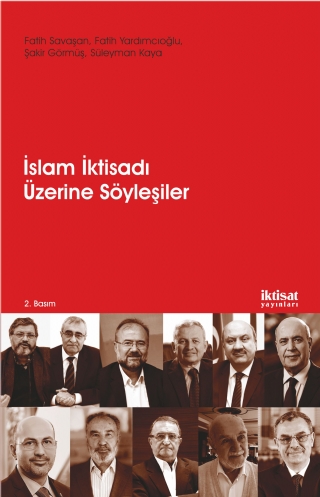
Many issues such as what the economic view of Islam is, whether it offers an economic system, what solutions it provides to people's needs, and through which institutions historically Muslims carry out their economic activities have been discussed by different segments for a long time and still continue to be discussed. Not only theoretical efforts, but also many practical efforts have been put forward and institutions have been established. Sometimes the practice side, led by Islamic banks, directed other theoretical studies, and sometimes the theory tried to influence the practice. On the other hand, with the growth of Islamic finance, regulatory authorities have inevitably been included in this ecosystem. In the end, many stakeholders, interconnected or not, ponder on Islamic economics and finance and contribute to keeping this field on the agenda.
Studies in the field of Islamic economics and finance have increased for Turkey, especially after the 1980s. Islamic lawyers, employees in the Islamic finance sector, regulatory agencies, academics and many more contribute to the field. Among them, some names played leading roles in their own fields and have been influential in the reaching of Islamic economics and finance to a much wider audience today. This book consists of interviews with professors who have worked in this field for many years, industry representatives and regulators operating in the field of Islamic finance.
Studies in the field of Islamic economics and finance have increased for Turkey, especially after the 1980s. Islamic lawyers, employees in the Islamic finance sector, regulatory agencies, academics and many more contribute to the field. Among them, some names played leading roles in their own fields and have been influential in the reaching of Islamic economics and finance to a much wider audience today. This book consists of interviews with professors who have worked in this field for many years, industry representatives and regulators operating in the field of Islamic finance.
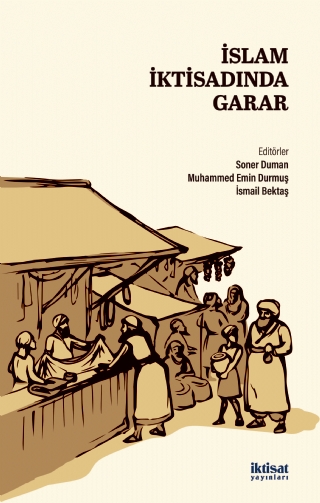
The most basic principles that Islam observes in human relations; observance of justice, prevention of injustice, ensuring social stability, entrusting the trust to those who are competent, open and transparent relations between people, preventing transactions and dispositions that may lead to conflicts between people. These principles also guided the instructions of Islam regarding commercial relations between people. In this context, tortious acts such as theft and extortion are prohibited, as well as interest, verbal or de facto cheating that leads to the exploitation of one party in contracts.
Garar, which is the subject of this book, is also prohibited because it causes commercial relations between people to be carried out in an open and transparent manner and cause conflicts and fights between people. The book consists of the papers presented in the workshop named "Garar in Classical Fiqh and Its Effect on Today's Economic Transactions", which was organized with the aim of addressing many aspects of the ban on garar, which was discussed in the classical fiqh literature and also encountered in modern economic transactions, by the participants, which were developed and converted into articles. This book, in which different authors deal with the prohibition of garar in Islamic fiqh from conceptual, intellectual and methodological perspectives, has been brought together in order to establish a solid link between our classical fiqh heritage and today's economic affairs.
Garar, which is the subject of this book, is also prohibited because it causes commercial relations between people to be carried out in an open and transparent manner and cause conflicts and fights between people. The book consists of the papers presented in the workshop named "Garar in Classical Fiqh and Its Effect on Today's Economic Transactions", which was organized with the aim of addressing many aspects of the ban on garar, which was discussed in the classical fiqh literature and also encountered in modern economic transactions, by the participants, which were developed and converted into articles. This book, in which different authors deal with the prohibition of garar in Islamic fiqh from conceptual, intellectual and methodological perspectives, has been brought together in order to establish a solid link between our classical fiqh heritage and today's economic affairs.
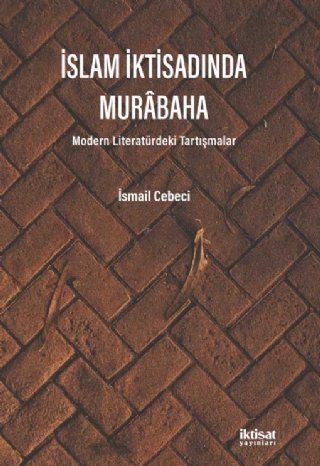
Murabaha contract is one of the most applied and discussed transactions in the interest-free financial system. In the process that has been going on since the 1970s, when interest-free banking began, the subject of murabaha, which has been in the field of interest of many scientific disciplines, especially fiqh and economics, has been an issue that has attracted the attention of the academic community as well as being important for the real sector. The main purpose of this study is to deal with the historical development of such a contract, to follow the stages it went through and to examine the debates about the problematic points it has.
Murabaha, which is known as "production support" and "corporate and individual financing support" in practice in Turkey, is a larger-scale and most widely used transaction today, has common issues with other investment-financing models, as well as many different The fact that it contains a problem point, is the most discussed transaction in the modern period, and shows how a classical contract was modernized are the factors that make this contract important. Murabaha fiqh, economic, social, etc. This study, which aims to address various aspects with a critical and holistic perspective and to reveal the course of reasoning and judgment-making activities in modern Islamic economics problems based on the existing literature, is a candidate to fill an important gap in the literature.
Murabaha, which is known as "production support" and "corporate and individual financing support" in practice in Turkey, is a larger-scale and most widely used transaction today, has common issues with other investment-financing models, as well as many different The fact that it contains a problem point, is the most discussed transaction in the modern period, and shows how a classical contract was modernized are the factors that make this contract important. Murabaha fiqh, economic, social, etc. This study, which aims to address various aspects with a critical and holistic perspective and to reveal the course of reasoning and judgment-making activities in modern Islamic economics problems based on the existing literature, is a candidate to fill an important gap in the literature.

There are many attempts to define the nature of man. The most common and almost agreed upon among these attempts is that man is a political creature. Man is a being who lives in a community, makes sense and establishes himself in a community. However, the transformation of this obligatory union of people into a good and fair system poses an important problem. Various political systems have been developed throughout history to establish and maintain such a social order. One of the most important and urgent problems facing humanity today is the formation of a good, beneficial and just order for everyone.
This work has been prepared in order to draw a theoretical framework for Islamic political thought by using the possibilities and tools of contemporary political science and political philosophy.
This book, which includes 11 articles written by competent academics in the field, aims to provide new expansions of classical origin to Islamic political thought, which has been shaped by Western influence in the modern period. For this reason, it aims to systematically address ancient issues in a conceptual continuity and thus to bring Islamic political thought to the present.
This work has been prepared in order to draw a theoretical framework for Islamic political thought by using the possibilities and tools of contemporary political science and political philosophy.
This book, which includes 11 articles written by competent academics in the field, aims to provide new expansions of classical origin to Islamic political thought, which has been shaped by Western influence in the modern period. For this reason, it aims to systematically address ancient issues in a conceptual continuity and thus to bring Islamic political thought to the present.

In the face of Europe's industrialization revolutions and its formation as developed economies, the Islamic world's inability to fully fulfill its growth and development steps has led to a misconception that Islam hinders development or progress for years. This perception has been expressed from time to time by some circles with good intentions or bad intentions. Is it really so? Does Islam have a religious understanding that only has an aspect towards the hereafter and is completely isolated from worldly life? How should the chapters in the Qur'an and hadiths that describe the dangers of wealth be understood? Does Islam have a relationship with capitalism and socialism? Can a Muslim be rich? Are there any rules for being rich and wealthy? What should be the balance between spending and hedonism? The fact that all these questions are often wrongly answered and misinterpreted by both the Islamic and non-Islamic worlds is an indication that the issue is not fully understood. Although this misunderstanding is considered reasonable by those who are far from the Islamic world, it is very sad that it is misunderstood and interpreted by the Islamic world.
In this study, the subject is evaluated from the perspective of Islam by considering the assumptions and approaches in Max Weber's work, which deals with the relationship between Protestant ethic and capitalism, and which is very popular. Can relationships similar to those established by Max Weber between capitalism and Protestant ethics be valid for the religion of Islam, or can similarities be drawn? In this study, the real Islamic economic system has been tried to be revealed by considering the subject in terms of these relations.
In this study, the subject is evaluated from the perspective of Islam by considering the assumptions and approaches in Max Weber's work, which deals with the relationship between Protestant ethic and capitalism, and which is very popular. Can relationships similar to those established by Max Weber between capitalism and Protestant ethics be valid for the religion of Islam, or can similarities be drawn? In this study, the real Islamic economic system has been tried to be revealed by considering the subject in terms of these relations.
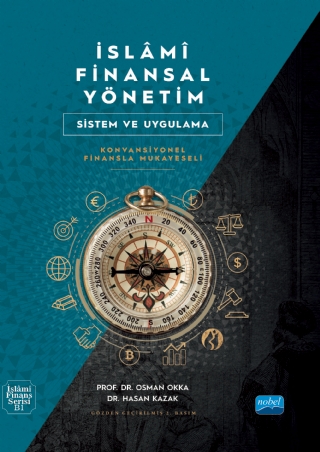
Today, due to the rapid development of the Islamic finance sector and the fact that Islamic funds are approaching 3 trillion dollars, interest in this field has increased gradually, on the one hand, publications in this field have increased, on the other hand, Islamic financial institutions have become institutionalized to a large extent. While all these developments were taking place, the aspect of Islamic finance towards companies together with institutions operating in money and capital markets - that is, studies on the application of national and international companies to ordinary, collective, commandite, limited, joint-stock and holding companies - remained relatively behind. This book has been prepared to meet this need, covering almost all areas of financial management and in comparison with conventional finance. For this reason, the book has an intermediate upper structure.
In the book, the basic principles of finance related to Islamic finance within the framework of Islamic law are presented to the reader in a systematized manner in a systematic way, in comparison with conventional finance, and it is shown in detail how Islamic finance can be applied in all areas of the activities of companies in real life. Thus, it is aimed for the reader to gain knowledge in a structure that can think financially with a numerical and analytical method and solve the financial problems of the company by producing policies in accordance with Islam. Case studies of Islamic finance in the 22nd chapter, that is, case studies, added a different dimension to the book.
In the book, the basic principles of finance related to Islamic finance within the framework of Islamic law are presented to the reader in a systematized manner in a systematic way, in comparison with conventional finance, and it is shown in detail how Islamic finance can be applied in all areas of the activities of companies in real life. Thus, it is aimed for the reader to gain knowledge in a structure that can think financially with a numerical and analytical method and solve the financial problems of the company by producing policies in accordance with Islam. Case studies of Islamic finance in the 22nd chapter, that is, case studies, added a different dimension to the book.
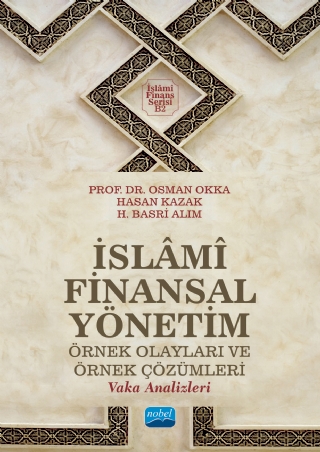
(B-1) Islamic Financial Management: System and Practice (Compared with Conventional Finance) in the first book of the series, what Islamic finance is and its application in today's modern companies (ordinary, collective, commandite, limited, joint-stock, holding companies) by taking into account the Islamic rules on this subject. shape was examined in comparison with conventional firms. Rational behavior and behavior do not change in conventional or Islamic finance. Every person or company tries to act, win, act efficiently in order to be optimal (the best); What is different is that the Islamic financier and manager must act and be successful by taking into account the prohibited and unethical rules according to Islam. As it is known, conventional companies; According to Islam, all kinds of interest, deceitful, morally corrupting, defective, adulterous, causing usurpation of rights, harmful to society, etc., which are considered haram. If they do not engage in activities, they become an Islamic firm. If Islamic companies carry out their activities without considering the harams and prohibitions of Islam, they also turn into conventional companies. Switching between companies is that simple. If an Islamic firm has engaged in haram activities, it first tries to prevent them and at the end of the period, it tries to remove the haram revenues from the firm. In order not to make mistakes, the Islamic financial manager has to know and apply the rules of both conventional and Islamic finance.
In today's economic system, where extreme competition and high capital costs dominate; In order to understand the problems of financial managers and the role of Islamic finance correctly, and then to make the right financial decisions about the company, they need to see real-life financial management problems closely and produce solutions on these problems. These are case studies; It has been prepared to enable our readers to see themselves in the virtual environment of the company, to penetrate deeply into financial management problems, to produce alternative solutions within the framework of Islamic rules and to improve their ability to make the right decision. The book acts as a finance simulator for financiers and those who want to become financiers, as well as company managers. We hope that this book titled (B-2) Islamic Financial Management Case Studies and Case Studies (Case Analysis), which covers 50 case studies, will be useful to you.
In today's economic system, where extreme competition and high capital costs dominate; In order to understand the problems of financial managers and the role of Islamic finance correctly, and then to make the right financial decisions about the company, they need to see real-life financial management problems closely and produce solutions on these problems. These are case studies; It has been prepared to enable our readers to see themselves in the virtual environment of the company, to penetrate deeply into financial management problems, to produce alternative solutions within the framework of Islamic rules and to improve their ability to make the right decision. The book acts as a finance simulator for financiers and those who want to become financiers, as well as company managers. We hope that this book titled (B-2) Islamic Financial Management Case Studies and Case Studies (Case Analysis), which covers 50 case studies, will be useful to you.
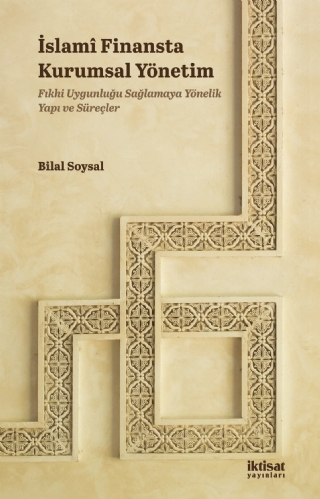
For an Islamic financial institution to survive and grow, it is essential that all stakeholders adopt a corporate governance approach to increase their trust in the institution. An effective corporate governance is necessary for an Islamic financial institution to manage the risk of non-compliance with Fiqh principles and rules, to grow in a healthy way, and to properly protect the interests of all stakeholders. In this context, an important part of corporate governance in Islamic financial institutions is an effective "Fiqh Compliance Management System" aimed at ensuring the compliance of activities with fiqh principles and rules. This book explains the Fiqh Compliance Management System in Islamic financial institutions in detail within the framework of literature and international standards, and the approaches of countries to the subject. it reflects in the context of legal regulations and reveals the situation of Turkey compared to other countries.
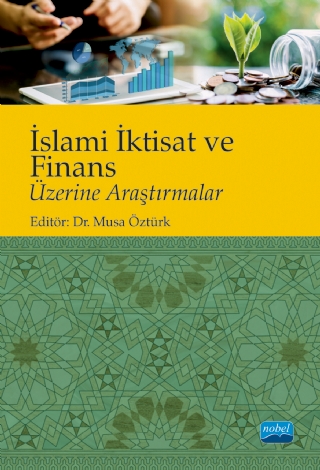
The problems we face today, where perhaps the fastest transformations in the history of humanity are experienced, trigger the search for a new normal, system and order in order to protect the current gains and to ensure an inclusive and sustainable growth and development process. These searches, which take place in almost every field, especially in socioeconomic and political fields; re-understanding the old, the re-discovery of the new, and the examination of the interaction between the old and the new. From an economic point of view as a result of these searches, discussions on the new economic system are being mobilized, and the problems of what will replace the old systems, how the new order will function, and how to define the roles of these new normally known economic actors are questioned -objectively and normatively. One of the efforts made in this context is the studies carried out within the scope of Islamic Economics and Finance, which is the richest in terms of experience, originality and consistency, and the impact/repercussion of these studies is increasing and expanding day by day across the world.
In order to support this effect/echo, this book, which was initiated by using the blind arbitrator process, begins by examining the subject of interest, which functions as litmus paper in terms of economic thought and systems. After the interest topic, there are sections on zakat, the state, solidarity institutions and participation banks, respectively. Within the scope of Islamic Finance; financing models, blockchain technology, behavioral finance and investment attorneyship are examined, followed by applied studies on the economy-finance relationship. Thus, it has been tried to contribute to the efforts of humanity in general and Turkey in particular to get rid of the systematic bottlenecks and deadlocks, and to the aims of understanding the old, discovering the new and examining the old-new interaction within the scope of Islamic Economics and Finance.
In order to support this effect/echo, this book, which was initiated by using the blind arbitrator process, begins by examining the subject of interest, which functions as litmus paper in terms of economic thought and systems. After the interest topic, there are sections on zakat, the state, solidarity institutions and participation banks, respectively. Within the scope of Islamic Finance; financing models, blockchain technology, behavioral finance and investment attorneyship are examined, followed by applied studies on the economy-finance relationship. Thus, it has been tried to contribute to the efforts of humanity in general and Turkey in particular to get rid of the systematic bottlenecks and deadlocks, and to the aims of understanding the old, discovering the new and examining the old-new interaction within the scope of Islamic Economics and Finance.

While the human element that makes up the society affects geography and culture on the one hand, it is also affected by geography and culture. The human element of the social structure consisting of men and women differs from society to society according to the position of these two sexes in the structure. The position of women and men in society is one of the most important factors in determining the place of that society in other societies.
The meanings ascribed to women and men by society differentiate and differentiate the contributions of the sexes to social life, even by drawing sharp boundaries, sometimes visible and sometimes invisible barriers/prohibitions. This situation; It affects every aspect of the social structure, from family life regulated by gender to individual relations, from business life to educational status.
The cultural rituals, which constitute the main source of the differences in the social roles of these two sexes, in which the existence of one is not possible without the other, has sometimes brought the woman to the fore, sometimes the man, to the point of dominating the other and even depriving him of all kinds of rights. This deprivation and domination has been mostly in favor of men in the history of humanity, and women have been pushed into the secondary plan by being overshadowed by men in almost every era and society.
This book; “Women in Turks”, “Women in Anatolia”, “Women in Nomadic Culture”, “Bacıyan-ı Rum and Women Craftsmen in Anatolia”, Women in the West”, “II-IX. It covers the topics of "Women and Music in the Turks in the Centuries", "Violence Against Women", "Women with Statistics", "Education of Girls in the Late Ottoman Period and the Professional Life of Teacher Faika Ünlüer".
The meanings ascribed to women and men by society differentiate and differentiate the contributions of the sexes to social life, even by drawing sharp boundaries, sometimes visible and sometimes invisible barriers/prohibitions. This situation; It affects every aspect of the social structure, from family life regulated by gender to individual relations, from business life to educational status.
The cultural rituals, which constitute the main source of the differences in the social roles of these two sexes, in which the existence of one is not possible without the other, has sometimes brought the woman to the fore, sometimes the man, to the point of dominating the other and even depriving him of all kinds of rights. This deprivation and domination has been mostly in favor of men in the history of humanity, and women have been pushed into the secondary plan by being overshadowed by men in almost every era and society.
This book; “Women in Turks”, “Women in Anatolia”, “Women in Nomadic Culture”, “Bacıyan-ı Rum and Women Craftsmen in Anatolia”, Women in the West”, “II-IX. It covers the topics of "Women and Music in the Turks in the Centuries", "Violence Against Women", "Women with Statistics", "Education of Girls in the Late Ottoman Period and the Professional Life of Teacher Faika Ünlüer".

The period between 1960 and 1980 is a period that is talked about a lot in Turkey, but little is known about it. This work; tells the story of this critical period through visuals. Islamism, like other currents of thought, became more visible in the 1960s.
and acquired an assertive language. From this point of view, 1960Tar embodies various beginnings for Turkish political and intellectual life and is vital in terms of understanding the aftermath. This book deals with the emergence of new public manifestations of Islam in Turkey since the 1960s. For this purpose, the book is knitted around selected images from magazines. This work, which we call publicized Islam, tells us about the return of the oppressed. As the pages of the book are opened, it is witnessed that Islam gains visibility in public life gradually. The manifestation of a different aspect awaits the reader on each page. This study, which deals with the subject through visuals, offers a new horizon in understanding the intellectual history of Turkey.
and acquired an assertive language. From this point of view, 1960Tar embodies various beginnings for Turkish political and intellectual life and is vital in terms of understanding the aftermath. This book deals with the emergence of new public manifestations of Islam in Turkey since the 1960s. For this purpose, the book is knitted around selected images from magazines. This work, which we call publicized Islam, tells us about the return of the oppressed. As the pages of the book are opened, it is witnessed that Islam gains visibility in public life gradually. The manifestation of a different aspect awaits the reader on each page. This study, which deals with the subject through visuals, offers a new horizon in understanding the intellectual history of Turkey.
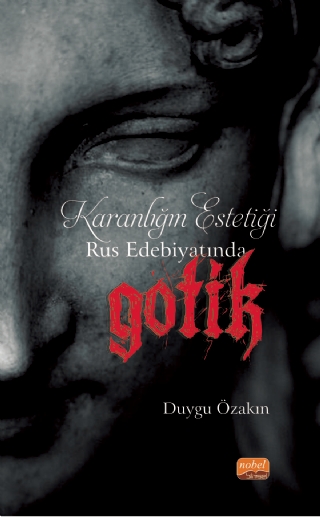
Gothic as a historical stamp, an art movement, a subculture and an academic research area, respectively, continued on the path from history with architecture, and after penetrating literature from there, it entered the agenda of contemporary studies that dealt with literary products from a sociological perspective, passing through the lens of attention to society. This term, which takes its name from the invasion and plundering of the Gothic tribes in 410 AD, was first used by the Italian art historian Giorgio Vasari in 1550 to describe an architectural style as a substitute for the concept of "barbarian" and has since indicated the uncivilized.
This book; It examines the adaptations of the Gothic tradition, which owes its rebirth to its adoption by a group of literary figures in the late 18th century, in Russian literature, from Orest Somov to Nikolay Polevoy, from Vsevolod Garşin to Fyodor Dostoyevsky, in line with contemporary Gothic theories. For this purpose, he traces the “barbarian” identities of the Gothic tribes, which first permeated the historiography and then the art history terminology after their raids on Rome, in the orbit of Gothic themes such as madness and suicide, and contemporary classifications such as Urban Gothic and the uncanny, with the method of sociological criticism.
This book; It examines the adaptations of the Gothic tradition, which owes its rebirth to its adoption by a group of literary figures in the late 18th century, in Russian literature, from Orest Somov to Nikolay Polevoy, from Vsevolod Garşin to Fyodor Dostoyevsky, in line with contemporary Gothic theories. For this purpose, he traces the “barbarian” identities of the Gothic tribes, which first permeated the historiography and then the art history terminology after their raids on Rome, in the orbit of Gothic themes such as madness and suicide, and contemporary classifications such as Urban Gothic and the uncanny, with the method of sociological criticism.

The process of "masking the society" with Covid-19 inevitably affects religious beliefs and practices. Social obligations and the sanctioning power of the state deeply affect the familiar things of religion such as gathering, worshiping collectively, synchronously repeating the sacred words, touching and feeling, in other words, the way religion is experienced. The physical nature of worship can be transferred to online environments, and unexpected and radical measures can be taken, such as closing mosques for worship as in Turkey, suspending Hajj by the Saudi government, or burning Muslims who died of Covid-19 in Sri Lanka, by government force. Similarly, New Age beliefs can continue to develop their market and gather new followers by associating bodily health with the transcendent by taking advantage of this gap, Muslims in India can be labeled as "super spreaders" of Covid-19, and in many places people are subject to social exclusion due to their religious identity. may be exposed.
Although the Covid-19 epidemic is a multidisciplinary and interdisciplinary phenomenon that needs to be dealt with within the framework of understanding, the effect of this process on religious beliefs and practices should be determined, and especially the process and its results should be discussed by the Turkish academy. It is thought that this book project, which consists of twelve chapters and was prepared with the participation of 14 authors who produce in fields such as sociology, sociology of religion and philosophy of religion, will contribute to the academicians and students working in the related field, as well as to the family of readers who are interested in this field.
Although the Covid-19 epidemic is a multidisciplinary and interdisciplinary phenomenon that needs to be dealt with within the framework of understanding, the effect of this process on religious beliefs and practices should be determined, and especially the process and its results should be discussed by the Turkish academy. It is thought that this book project, which consists of twelve chapters and was prepared with the participation of 14 authors who produce in fields such as sociology, sociology of religion and philosophy of religion, will contribute to the academicians and students working in the related field, as well as to the family of readers who are interested in this field.

One of the most important and prioritized elements that ensure the continuity of a branch of science is the determination of its central concepts and ensuring its natural continuity. In particular, the studies to be carried out within the framework of social sciences give clues about the scientificization processes of the relevant branch of science, as the concepts corresponding to the reasonable meanings in the field of that science are attributed to the term/term, which means that they are a name for a meaning in the language.
Today, the dominant concept in social sciences and the terminological expressions accordingly are determined on the axis of the dominance of Eurocentric definitions, and this concept-definition relationship ensures the continuation of Eurocentric interpretations. In this way, definitions made with concepts produced contrary to the core values and structure of society prevent authentic productions in social sciences. The development of a correct social science, which takes into account the structure and culture of the Islamic society, and accordingly providing a correct scientific thought ground, first of all necessitates a conceptual and theoretical framework that can be followed in terms of local and origins.
The book in your hand has been prepared in order to lay the groundwork for developing new concepts in social sciences in line with these requirements and to identify areas of opportunity.
Today, the dominant concept in social sciences and the terminological expressions accordingly are determined on the axis of the dominance of Eurocentric definitions, and this concept-definition relationship ensures the continuation of Eurocentric interpretations. In this way, definitions made with concepts produced contrary to the core values and structure of society prevent authentic productions in social sciences. The development of a correct social science, which takes into account the structure and culture of the Islamic society, and accordingly providing a correct scientific thought ground, first of all necessitates a conceptual and theoretical framework that can be followed in terms of local and origins.
The book in your hand has been prepared in order to lay the groundwork for developing new concepts in social sciences in line with these requirements and to identify areas of opportunity.

“Ancient cities, medieval cities and modern cities, cities in capitalist countries, cities in socialist countries, and cities in Third World countries—all of these were within our broad intellectual framework. The resulting urban sociology could be anything you can think of, if you knew it was happening in cities. If you could see it, then you could see it discussed elsewhere in the literature of urban sociology." Saunders, R (2013). Social theory: Urban sociology (S. Bring Right, Trans.). Ideal Culture Publishing.
The construction of the city and the spread of cities to almost every corner of the world has been one of the most successful human creations of all time. Although it is very difficult to make a classification about the city and urban studies, which has been discussed in many ways, associated with different disciplines and has a rich literature written on it, the framework of this book covers a broad perspective from demography to the phenomenon of urbanization, from rural practices to the process of squatting, from social mobility to migration studies. and developed incrementally.
Introduction to Urban Studies aims to illuminate the dynamics of the past and present by approaching, step by step, the issues of city, dirt and migration, which still remain important and do not fall off the agenda. This work, which can be used by both those who are interested in urban studies and experts, is important in terms of being a starter book and creating integrity in the academic context.
The construction of the city and the spread of cities to almost every corner of the world has been one of the most successful human creations of all time. Although it is very difficult to make a classification about the city and urban studies, which has been discussed in many ways, associated with different disciplines and has a rich literature written on it, the framework of this book covers a broad perspective from demography to the phenomenon of urbanization, from rural practices to the process of squatting, from social mobility to migration studies. and developed incrementally.
Introduction to Urban Studies aims to illuminate the dynamics of the past and present by approaching, step by step, the issues of city, dirt and migration, which still remain important and do not fall off the agenda. This work, which can be used by both those who are interested in urban studies and experts, is important in terms of being a starter book and creating integrity in the academic context.
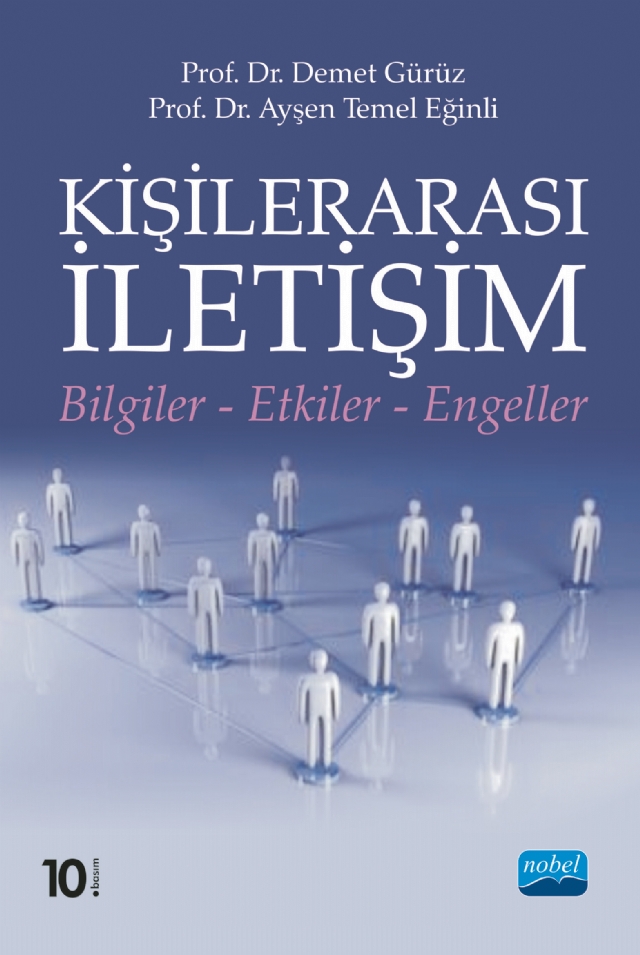
Interpersonal communication begins with two people noticing each other and accepting each other's existence. In this process, the person; It conveys messages with its attitudes, personality, behaviors, what it does and does not do, what it says and does not say.
We are in the age of communication… If we are still talking but not explaining, telling but not being understood, talking but not listening, talking but not listening, talking and listening but still not being able to understand… our verbal and nonverbal messages, the factors that affect or hinder our communication should be questioned before our communication ends.
I guess I didn't understand...
You misunderstood me…
I wish I hadn't said that...
Oh my prejudices...
His tone sounded angry…
He made such an emphasis that…
Your eyes didn't say that, but…
He shook hands as if breaking my fingers…
What a stance it was, it told a lot…
Interpersonal Communication -Information-Impacts-Obstacles- evaluates various aspects of the interpersonal communication process with examples. In this sense, the book will shed light on both researchers who continue their academic studies and anyone who wants to communicate effectively.
We are in the age of communication… If we are still talking but not explaining, telling but not being understood, talking but not listening, talking but not listening, talking and listening but still not being able to understand… our verbal and nonverbal messages, the factors that affect or hinder our communication should be questioned before our communication ends.
I guess I didn't understand...
You misunderstood me…
I wish I hadn't said that...
Oh my prejudices...
His tone sounded angry…
He made such an emphasis that…
Your eyes didn't say that, but…
He shook hands as if breaking my fingers…
What a stance it was, it told a lot…
Interpersonal Communication -Information-Impacts-Obstacles- evaluates various aspects of the interpersonal communication process with examples. In this sense, the book will shed light on both researchers who continue their academic studies and anyone who wants to communicate effectively.

Jerusalem contains a witness that has been given to very few cities in history. In the past century, the occupation of Jerusalem and the problems of the Islamic World have progressed in parallel. This situation requires a multidimensional evaluation with its intellectual, geographical, socio-cultural and economic components, beyond being an issue that only awaits a political solution.
Jerusalem studies are getting richer day by day. Uncovering the social and spatial remnant of the ancient city and producing the scientific archive against the destruction of Jerusalem by reduced interventions to the nation ideology is seen as an indispensable prerequisite for these researches.
The book in your hand has been prepared with the aim of contributing to the expanding Jerusalem Library in Turkey. In the book, a versatile Jerusalem perspective is presented through original studies that evaluate Jerusalem in terms of its historical, cultural, urban and architectural dimensions and address the Jerusalem issue from the perspective of international law.
Jerusalem studies are getting richer day by day. Uncovering the social and spatial remnant of the ancient city and producing the scientific archive against the destruction of Jerusalem by reduced interventions to the nation ideology is seen as an indispensable prerequisite for these researches.
The book in your hand has been prepared with the aim of contributing to the expanding Jerusalem Library in Turkey. In the book, a versatile Jerusalem perspective is presented through original studies that evaluate Jerusalem in terms of its historical, cultural, urban and architectural dimensions and address the Jerusalem issue from the perspective of international law.

Spirituality is one of the important elements of the human experience. Spirituality, structures and behaviors related to spirituality have an undeniable potential in terms of well-being in sub-fields of psychology and especially psychological counseling. Spiritual experience, both positive and negative, cannot be separated from human functionality. In many applied and theoretical studies in the field of psychology, it has been wondered and examined how spirituality functions in human cognition, behavior and emotional processes since the early years of the field's formation. Especially in recent years, spirituality has started to be considered as a potential resource in terms of psychological well-being and functionality in applied psychology research and psychological help fields, and many approaches and methods have been developed that take spirituality into account in the psychological help process. The book is the first of its kind in Turkey with a comprehensive content of spiritual counseling services in institutions, from the spiritual aspects of counseling theories, to the spiritual evaluation of the clients, to the relations of various religious traditions with spiritual counseling. The book, which aims to shed light on the transcendent dimension of human beings for students and employees who receive education in all fields of mental health, especially PDR and Psychology, is enriched with case examples.

In today's world where the expressions of the imagination of civilization are used frequently, it is necessary to realize that civilization is and can be based on a philosophical unity and harmony in order for the actual content and meaning of this term to be realized.
Civilization and Philosophy is a study that brings up the mutual relations of these two fields and what they owe to each other. It seems to be an invitation to examine and scrutinize these areas. The studies brought together in this book, which can be read as a landmark on the way to reach the philosophical consciousness of our civilization and to make a philosophical critique, had previously reached a limited audience as articles, papers and conferences. Now, this issue, which is one of the main agenda items of Turkish Thought, is presented to the attention of a wider readership.
We hope that this work will be an opportunity to realize that the idea of a civilization without philosophy would be wrong.
Civilization and Philosophy is a study that brings up the mutual relations of these two fields and what they owe to each other. It seems to be an invitation to examine and scrutinize these areas. The studies brought together in this book, which can be read as a landmark on the way to reach the philosophical consciousness of our civilization and to make a philosophical critique, had previously reached a limited audience as articles, papers and conferences. Now, this issue, which is one of the main agenda items of Turkish Thought, is presented to the attention of a wider readership.
We hope that this work will be an opportunity to realize that the idea of a civilization without philosophy would be wrong.
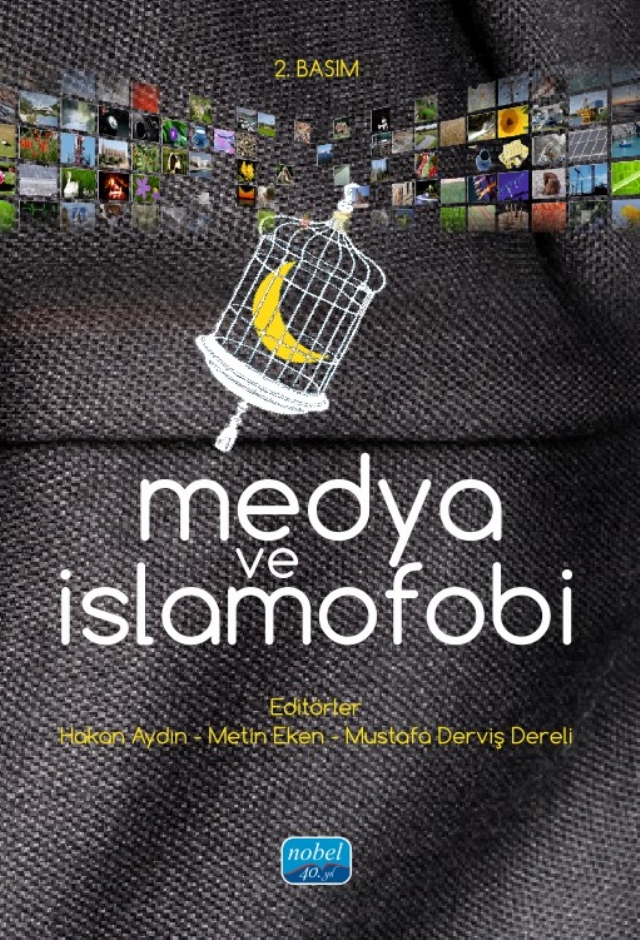
In recent years, Islamophobia, as an expression of fear based on prejudice and discrimination, has become one of the most fundamental psychological, social and political problems that lead to antipathy, hatred, violence and hostility towards Muslims all over the world. Exclusion in processes related to political administration, social responsibilities and employment; discrimination in the provision of services such as education and health; Prejudice in media and daily conversations and in daily life both verbal and physical violence produces many negative results. The media plays a very active role in the production and shaping of the perception that reveals these results. The effects of Islamophobic elements, which spread from traditional media elements to new media, have not yet been adequately addressed academically and sufficient information has not been produced to affect the policies on this issue. This study, which includes some important book reviews in addition to sixteen articles, is expected to constitute an important source for the questioning of the relation between the media and Islamophobia, as well as the relation between media and religion in Turkey.

XIX. historiography in 19th-century Egypt; It is analyzed through Abdurrahman al-Ceberti, Abdullah al-Sharkavi, Ismail al-Haşşâb, Ahmed er-Recebî, Nikola et-Türk and their works. This work, which is the first in Turkish literature, deals with the main sources in Arabic as well as related researches in the English and partly French literature. The work has a special importance in Ottoman historiography as it enables the comparison of the last period historiography. In this respect, it presents interesting examples from the field about historiography, historical thought and procedure. In the work; Mamluks, Wahhabis, Azhar ulema, Egyptian society, declarations about the propaganda of the image of Muslim-French distributed to the public during the French occupation, Kavalalı Mehmed Ali Pasha and his period are among the prominent issues.
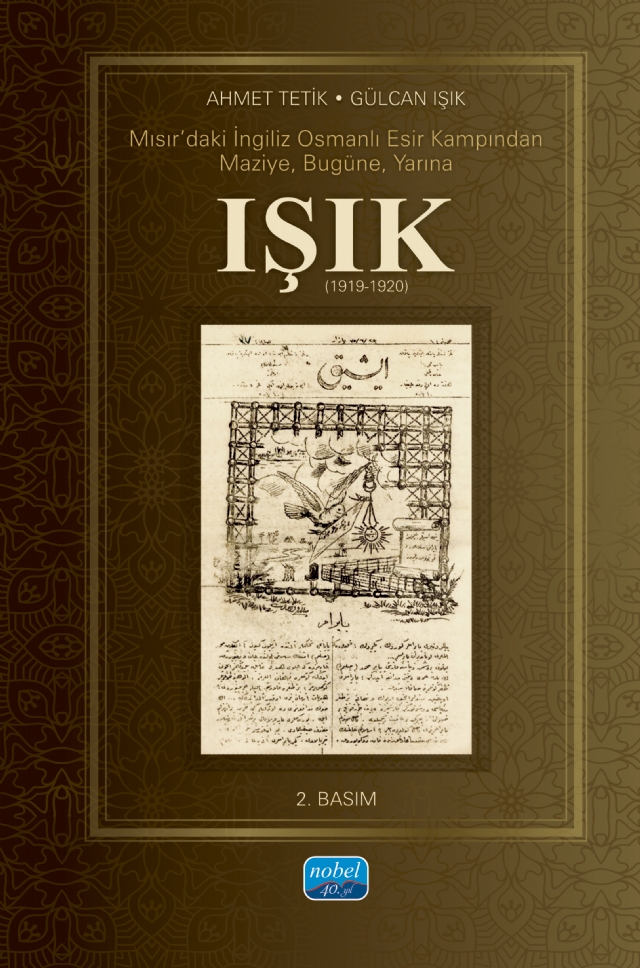
LIGHT from the British Ottoman Prisoner Camp in Egypt to the Past, Present, and Tomorrow (1919-1920)
One of the camps in Egypt, where the soldiers of the Ottoman Army, who fought on the fronts of the First World War, and the soldiers who were taken prisoner by the British, were kept, is the "Tura Prisoner Camp" near Cairo. The war ended in 1919, but the captives could not be released yet.
In the camp, the captive Turkish officers, who are not detached from the world, publish a handwritten newspaper in order to protect their resistance, to make evaluations to prepare today for tomorrow, to keep the struggle for freedom and patriotism mentally, even though they are in captivity financially: LIGHT!
To live is to build tomorrow today, not yesterday. Those in the camp are also conscious of this. “It should not be forgotten that people who look at the ukba rather than the world; They neglect their welfare between the cradle and the grave.” The intact bodies of those found in Tura are the most valuable gift for "the homeland whose cemeteries have increased and its vigor has decreased". "Life; It is not just a heavy ordeal that ends in death, as we understand it.” Turkish soldiers living in captivity, the Turkish Nation "If it was defeated in China, it was defeated in India. If he left Turan, he entered Iran. If it sank in Persia, it came out in Byzantium." they know the truth. They have to create a happy tomorrow out of a great disaster.
To be defeated is not to die. Those who are imprisoned behind the fence in Tura are the life of tomorrow. Them; “They are the lights of a poor land.” They cannot waste their time in captivity in vain, they cannot laugh and have fun. “A generation that does not think about tomorrow in every minute that interferes with the past; It is not capable of standing up cross-legged beings.”
LIGHT; “Phoenix” reborn after a century from the ashes of captivity…
In the camp, the captive Turkish officers, who are not detached from the world, publish a handwritten newspaper in order to protect their resistance, to make evaluations to prepare today for tomorrow, to keep the struggle for freedom and patriotism mentally, even though they are in captivity financially: LIGHT!
To live is to build tomorrow today, not yesterday. Those in the camp are also conscious of this. “It should not be forgotten that people who look at the ukba rather than the world; They neglect their welfare between the cradle and the grave.” The intact bodies of those found in Tura are the most valuable gift for "the homeland whose cemeteries have increased and its vigor has decreased". "Life; It is not just a heavy ordeal that ends in death, as we understand it.” Turkish soldiers living in captivity, the Turkish Nation "If it was defeated in China, it was defeated in India. If he left Turan, he entered Iran. If it sank in Persia, it came out in Byzantium." they know the truth. They have to create a happy tomorrow out of a great disaster.
To be defeated is not to die. Those who are imprisoned behind the fence in Tura are the life of tomorrow. Them; “They are the lights of a poor land.” They cannot waste their time in captivity in vain, they cannot laugh and have fun. “A generation that does not think about tomorrow in every minute that interferes with the past; It is not capable of standing up cross-legged beings.”
LIGHT; “Phoenix” reborn after a century from the ashes of captivity…
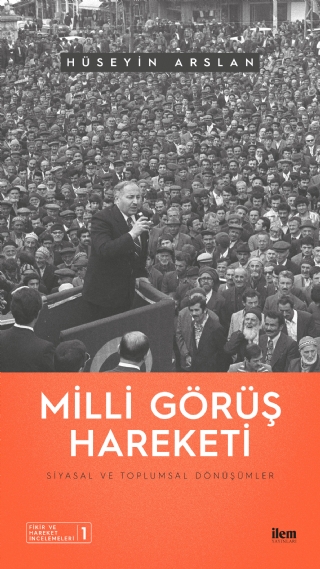
The book Milli Gorus Movement: Political and Social Transformations is an analysis of a movement that left its mark on the political history of Turkey and became the catalyst for social transformation. The Milli Gorus movement, which started with the entry of Necmettin Erbakan into politics in 1969, marks a turning point for Turkish political life and Islamist thought.
The history of Turkey cannot be analyzed clearly without considering the National Vision movement, which is the core of many social structures, institutions and political parties that still affect Turkish politics today.
With the "Idea and Movement Studies" series, it is aimed to present a framework and an original view on the main names, journals and issues that reflect the intellectual accumulation of Islamism and appear in almost every field. The books to be included in the series cover topics that are curious in different fields of Islamist thought. In this framework, it is aimed to contribute to the understanding of the issues on a basic and introductory level.
The history of Turkey cannot be analyzed clearly without considering the National Vision movement, which is the core of many social structures, institutions and political parties that still affect Turkish politics today.
With the "Idea and Movement Studies" series, it is aimed to present a framework and an original view on the main names, journals and issues that reflect the intellectual accumulation of Islamism and appear in almost every field. The books to be included in the series cover topics that are curious in different fields of Islamist thought. In this framework, it is aimed to contribute to the understanding of the issues on a basic and introductory level.

The relatively indifferent attitudes in the first weeks, when the source and spread of the COVID-19 virus were associated with a foreign and distant place (Wuhan) and an other (Asian) identity, gave way to rapidly increasing social anxiety as the danger began to spread rapidly across borders and approach home, and with it media attention. also rose rapidly. These days and later, when danger enters the home, people have had a variety of rational and irrational responses to the risks of COVID-19.
In this case, it can be said that individuals and communities who have different experiences in different places, in the past and now, experience the pandemic in different ways, attribute different meanings to it and show different reactions. While it is necessary and important to understand the physical/biological causes and consequences of the pandemic, it is also necessary and important to understand how people experience it, how and in what ways they make sense of it in their life world. Undoubtedly, this task is a responsibility on the shoulders of social scientists. Collaboration between social scientists and practitioners is vital to understand the key social and cultural characteristics of the local contexts of pandemic-affected areas and to foresee how these will directly impact strategies and practices regarding pandemic response. In order to better control and prepare for pandemics, it is necessary to investigate their social, cultural, economic and political contexts. By focusing on this assignment, this book aims to make a modest contribution to the advancement of our knowledge and understanding of the reality of the pandemic in particular of COVID-19.
Consisting of five very comprehensive and twenty-three chapters, the book is the product of a continuing academic interest in the reality of natural and man-made disasters and offers a multidisciplinary view of pandemics in particular COVID-19. In this respect, the book gives the reader the chance to see how the pandemic phenomenon can be approached from different perspectives. While doing this, the book, which not only brings together experienced academics in the field, but also opens up space for young and talented researchers, sheds a questioning light on the pandemic situations of modernity.
In this case, it can be said that individuals and communities who have different experiences in different places, in the past and now, experience the pandemic in different ways, attribute different meanings to it and show different reactions. While it is necessary and important to understand the physical/biological causes and consequences of the pandemic, it is also necessary and important to understand how people experience it, how and in what ways they make sense of it in their life world. Undoubtedly, this task is a responsibility on the shoulders of social scientists. Collaboration between social scientists and practitioners is vital to understand the key social and cultural characteristics of the local contexts of pandemic-affected areas and to foresee how these will directly impact strategies and practices regarding pandemic response. In order to better control and prepare for pandemics, it is necessary to investigate their social, cultural, economic and political contexts. By focusing on this assignment, this book aims to make a modest contribution to the advancement of our knowledge and understanding of the reality of the pandemic in particular of COVID-19.
Consisting of five very comprehensive and twenty-three chapters, the book is the product of a continuing academic interest in the reality of natural and man-made disasters and offers a multidisciplinary view of pandemics in particular COVID-19. In this respect, the book gives the reader the chance to see how the pandemic phenomenon can be approached from different perspectives. While doing this, the book, which not only brings together experienced academics in the field, but also opens up space for young and talented researchers, sheds a questioning light on the pandemic situations of modernity.
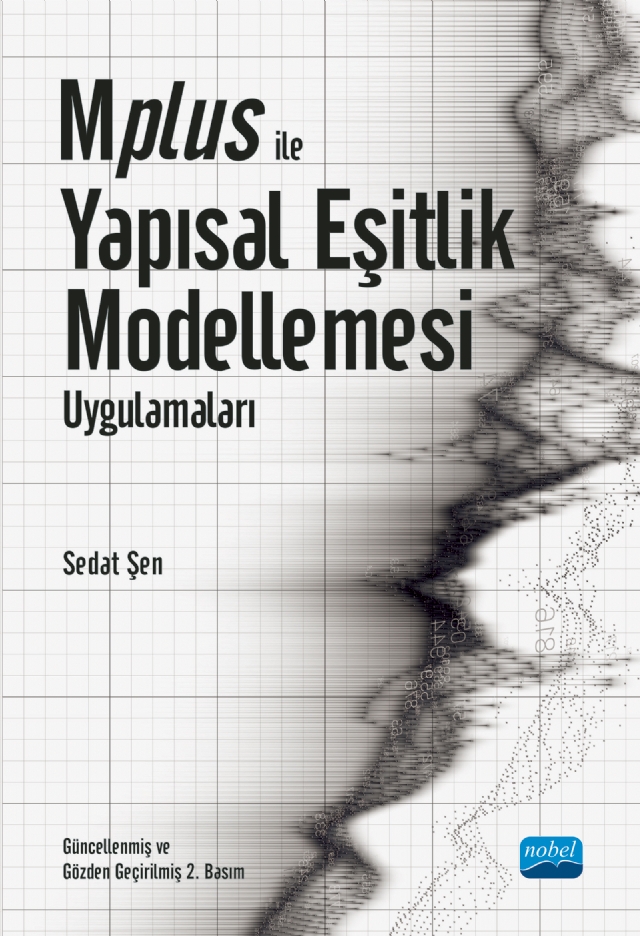
Structural equation modeling has become a frequently used methodology both in social sciences and other fields in recent years. This methodology can be used in analyzes such as scale development, examining the psychometric properties of the scale, measuring invariance, testing multivariate models, estimating direct and indirect effects, as well as providing researchers with the opportunity to test their theories on empirical data. As in other multivariate statistics, advanced computer software is needed for parameter estimation in structural equation modeling. Mplus program, which is among the structural equation modeling software, has become a prominent latent variable program in recent years thanks to the flexibility it offers. This book, which is the first work on the Mplus program written in Turkey, focuses on how to implement structural equation modeling applications with the Mplus program; Path analysis, confirmatory factor analysis, structural regression, latent growth models and applications of multigroup and multilevel models are included in the Mplus axis. The main purpose of this book is to facilitate the understandability and applicability of structural equation modeling for readers. Hope it will be a useful reference resource for anyone who plans to use structural equation modeling in their research with the Mplus program...

Studies on Islamic movements, or more specifically the Muslim Brotherhood, have often focused on ideological foundations or tensions with the political regime. Although there are a limited number of analyzes on the organizational structure of the movements, the way they are organized, the method of education and ideological indoctrination in these studies, the factor of institutionalization has always been left out of consideration in these analyses. The most important reason underlying this is that Islamic movements are not accepted as political institutions. Considering that political institutions are structures that attribute value and identity to their members, Islamic movements should be accepted as political institutions and their institutionalization processes should be taken into account, since they have similar characteristics. In this context, the book in your hand tries to answer the question of how the institutionalization processes of Islamic movements should be analyzed based on the assumption that they are also political institutions. In the book, in the example of the Muslim Brotherhood, which is considered the pioneer of Islamic movements, the institutionalization problem of the Movement is analyzed over six parameters, and the level of institutionalization of the structure is analyzed within the framework of its relationship with the Egyptian regime, in addition to the internal tensions and debates it has experienced since 1928.
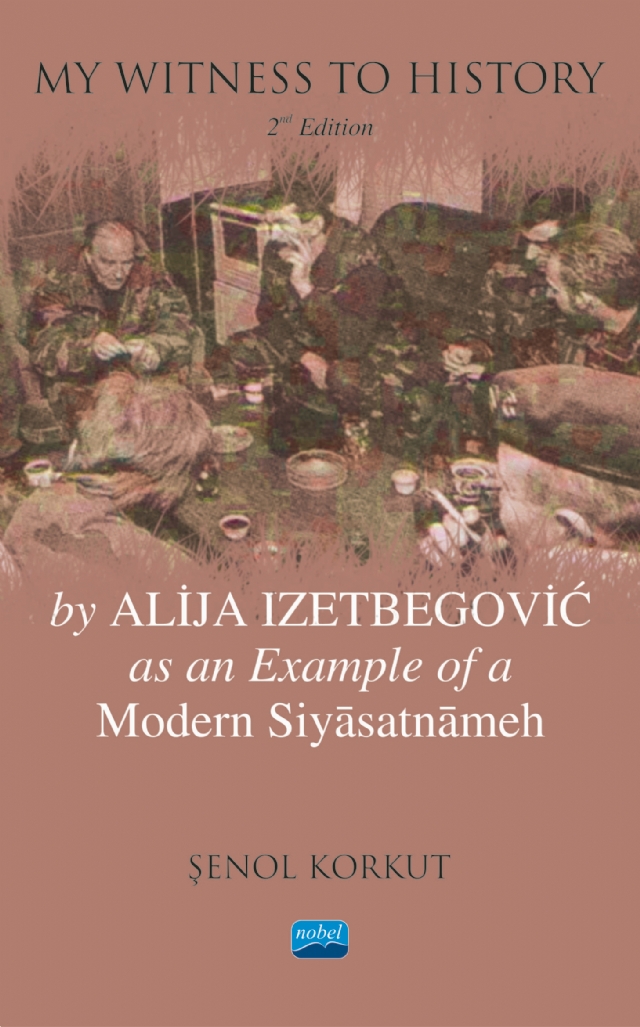
This book, subjects the basic dynamics of the Muslims of Bosnia and Herzegovina to a new reading through the memories of Alija Izetbegović (1925-2003), one of the most important Muslim intellectuals of the twentieth century. Izetbegović's pursuit of truth in his childhood and youth and his attitude towards the ideologies around him are taken in terms of the way a Muslim intellectual was brought up in the modern world. In the second part of the study, the importance of the Islamic Declaration for the current Islamic world, how to keep the Muslim identity alive under all conditions and the Islamic method to be developed for the policies of dimming the Muslim identity are examined. In the third part of the study, the importance of a Muslim party on the basis of the SDA and the principles to be derived from the struggle for existence during the Bosnia-Herzegovina war were examined. In the last part of the study, the current situation in Bosnia and Herzegovina after Dayton is discussed. The book seeks to construct a modern Siyāsatnāmeh based on the memories of Izetbegović.
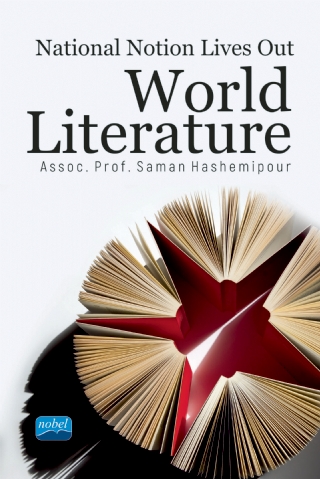
National Notion Lives Out World Literature is a collection of essays on literature. Discussing genres of fiction and must-to-know literary terms with examples help literary fans to understand the core of literature. Discussing the history of novels in Turkish and drama plays in Persian helps the reader to have a conscious view of fiction in Turkey and Iran. Besides, comparative literature in Eastern universities and the value of literary works in world literature are discussed. A comparative method of investigation and psychological stance is applied to evaluate literary and critical works to realize the concept of national literature in the realm of world literature.

This book includes quantitative, qualitative and mixed method research designs and statistics. Book; introduction to research, research problem, hypotheses and variables, measuring variables, universe and sample, quantitative research designs; single-subject studies; internet-based research; data collection methods, observation, questionnaire, interview; analysis of quantitative data, descriptive and descriptive statistics (hypothesis testing); qualitative research designs, analysis of qualitative research data; mixed method research designs, analysis of mixed method research data; It consists of the main parts of writing a research proposal and writing the report of the research.
The differences of this book from other research books are; explaining internet-based research in which there are rapid developments in that direction and showing how to do it; The aim is to integrate quantitative, qualitative and mixed method research approaches within the framework of scientific method, and to show which and how to use descriptive and descriptive statistics in accordance with research designs.
The book is an exemplary book based on practice rather than theory, which can be easily used by undergraduate and graduate students, lecturers, teachers and other interested parties who want to do research, and will guide them to do their own research. With the hope that it will contribute to science and the field and be useful to all concerned...
The differences of this book from other research books are; explaining internet-based research in which there are rapid developments in that direction and showing how to do it; The aim is to integrate quantitative, qualitative and mixed method research approaches within the framework of scientific method, and to show which and how to use descriptive and descriptive statistics in accordance with research designs.
The book is an exemplary book based on practice rather than theory, which can be easily used by undergraduate and graduate students, lecturers, teachers and other interested parties who want to do research, and will guide them to do their own research. With the hope that it will contribute to science and the field and be useful to all concerned...

Throughout history, Turkish-Russian relations have been one of the main elements, probably the most important, of the general view of the Eurasian region and the balance of power in this geography. This important rivalry, which started with the relations between the Ottoman Empire and the Russian Tsardom, at first tended to gain the appearance of cooperation after the establishment of the Soviet Union. With the World War II, this time it showed itself with the effect of an ideological separation. After the collapse of the Soviet Union, although there is no direct land border between Turkey and the Russian Federation, the intensity of relations between the parties has not decreased; on the contrary, due to Turkey's relationship with the Caucasus and Central Asian Turkic republics, it has gained even more importance.
There is a need for a better understanding of Russia in our country in order to better understand this new relationship ground, which often emerges as conflict/competition and sometimes as common understanding/cooperation. This academic study in your hand is of a quality that sheds light on our understanding of Russia's present and future, which takes its place in this dilemma from the point of view of Russia. Author Prof. Dr. In his work, Mesut Hakkı Caşın also uses the historical background and brief flashbacks necessary for a better understanding of this period, while trying to analyze the situation in the Russian Federation that emerged after Vladimir Putin became President. With these features, the study is a useful contribution to the efforts we feel lacking regarding Russia.
There is a need for a better understanding of Russia in our country in order to better understand this new relationship ground, which often emerges as conflict/competition and sometimes as common understanding/cooperation. This academic study in your hand is of a quality that sheds light on our understanding of Russia's present and future, which takes its place in this dilemma from the point of view of Russia. Author Prof. Dr. In his work, Mesut Hakkı Caşın also uses the historical background and brief flashbacks necessary for a better understanding of this period, while trying to analyze the situation in the Russian Federation that emerged after Vladimir Putin became President. With these features, the study is a useful contribution to the efforts we feel lacking regarding Russia.

The Middle East, which has been a center of attraction in every period of history due to its rich oil and natural gas deposits and being the center of monotheistic religions, is an unfortunate geography that has witnessed conflicts and wars in every period as a natural consequence of these characteristics. Factors such as power or prosperity revealed by classical approaches are insufficient to explain the events in international relations in the Middle East. Therefore, the internal dynamics of the region should be known very well. One of the most important internal dynamics in explaining the events in the region is the understanding of "Salaf" religion. This book explains the reasons for the events and conflicts in the Middle East by giving answers to questions such as what Salafism is, how it emerged, what historical processes it has reached today, what its types are, how it affects the people living in the region, events and international relations.

Throughout history, the Middle East has never lost its charm due to its strategic location and the political and economic expectations of global powers. The Middle East, which experienced a stable period during the rule of the Ottoman Empire (1517-1917), first came under the control of England and France with the disintegration of the Ottoman Empire at the end of the First World War, and then the USSR and the USA during the "Cold War" Period. It has been a field of contention in the political and military fields of the United States.
This second book, which was prepared as a continuation of the previous book "Middle East Perspective I", sheds light on the history of the Middle East, again with the contributions of many academicians, on the political, military and economic events experienced by the Middle East countries in the historical process.
This second book, which was prepared as a continuation of the previous book "Middle East Perspective I", sheds light on the history of the Middle East, again with the contributions of many academicians, on the political, military and economic events experienced by the Middle East countries in the historical process.

Although it is noteworthy that one of the cornerstones necessary to understand and make sense of the Middle East after the 2011 Arab uprisings is the relationship between politics and religion in the region, the importance of the issue is increasing day by day. As academics in Turkey, we tried to deal with the developments in the region and the background of the events.
As part of the ILEM Islamic Political Thought Project, we held a series of seminars under the heading "Politics and Religion in the Middle East". Our aim was to try to understand the politics-religion relationship in the region through different religious and political schools. In 2017, we tried to deal with issues in a different spectrum, from the origins of the two main currents in the region, $ii and Sunni political thoughts, to today's political reflections. Of course, the issues we deal with are neither limited to the seminars nor as they appear in the book; has much broader extensions. Nevertheless, we tried to produce a comprehensive and representative work.
As part of the ILEM Islamic Political Thought Project, we held a series of seminars under the heading "Politics and Religion in the Middle East". Our aim was to try to understand the politics-religion relationship in the region through different religious and political schools. In 2017, we tried to deal with issues in a different spectrum, from the origins of the two main currents in the region, $ii and Sunni political thoughts, to today's political reflections. Of course, the issues we deal with are neither limited to the seminars nor as they appear in the book; has much broader extensions. Nevertheless, we tried to produce a comprehensive and representative work.
